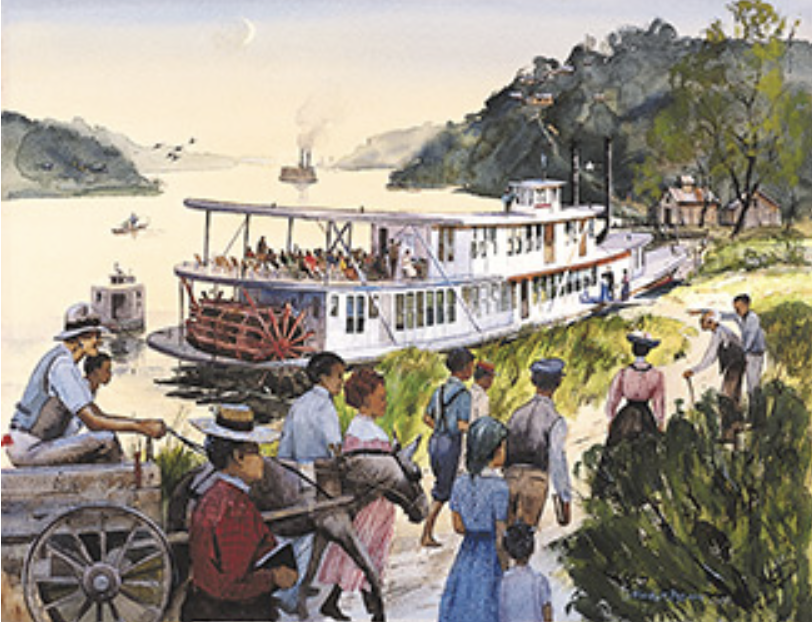by Washington Johnson

The Morning Star steamboat; image from Review and Herald Publishing Association
What seemed like a delayed answer to prayer turned out to be God’s perfect timing.
See the original Post: https://www.nadadventist.org/news/blessings-delay
James Edson White, the son of Adventist pioneers James and Ellen White, is credited with taking the gospel to African Americans in the southern United States — after having departed from the Adventist faith for approximately 30 years. Thankfully, the fervent prayers and countless letters from his mother resulted in his return to the Lord. He later read a life-altering pamphlet written by his mother entitled “Our Duty to the Colored People,” an appeal “made to denominational leaders in a meeting in the Battle Creek Tabernacle on March 21, 1891” to share the good news of the gospel with African Americans in the Southern region of the U.S.1
What may have seemed like a delayed answer to Ellen White’s prayers over the years that Edson was absent from the faith turned out to be God’s perfect timing for the gospel to be shared with former slaves and their children. White, along with longtime friend William O. Palmer, designed a paddlewheel steamboat named the Morning Star, which headed down the Mississippi River to function as an education center for teaching former slaves and their children basic skills, i.e., reading and writing, of which they had been previously deprived. Knowing how to read and write would also prove to be an inroad to having the ability to bring hope and wholeness to the lives of persons who had been deprived of knowing the liberating power of the gospel of Jesus Christ.
En route to Vicksburg, Mississippi, White was unexpectedly but divinely delayed in Memphis, Tennessee. The Morning Star had failed a federal government steamship inspection and was subsequently fined. The delay lasted several months, and initially the Morning Star crew was discouraged, but God had a purpose! While in Memphis, the crew sold present truth literature that inspired many locals. Edson also formed a friendship with an African American minister, A. H. Freeman, and began studying the Bible with him. Freeman subsequently decided to become an Adventist.2
The blessings did not stop there. In the fall of 1894 the first African American Seventh-day Adventist church was established in Memphis as the Mississippi Boulevard Seventh-day Adventist Church, which later became the Alcy Road and Longview Heights Seventh-day Adventist churches, respectively. After Edson’s work was completed, the initial fine was dismissed, and the Morning Star was once again under way.
Almost 75 years later, in the summer of 1969, Calvin B. Rock ,who then served as associate ministerial director for the Southern Union Conference, held a successful tent evangelistic meeting in South Memphis under the leadership of the late pastor Jackson Doggette, Sr. Rock would later go on to become the president of Oakwood College, now Oakwood University, and a vice president of the General Conference. According to Rock, the meeting took place during a time when “there was peak tension in the city of Memphis” because of the assassination of Martin Luther King, Jr., approximately one year prior. The Holy Spirit was undeniably guiding their efforts, with more than 200 converts being baptized in the meeting.
Remarkably, 100 of those baptized came from the efforts of my late mother, Bible worker extraordinaire Mildred P. Johnson. A college student at the time, Barry C. Black, the sixty-second chaplain of the U.S. Senate and former chief of chaplains of the United States Navy Chaplain Corps, also worked diligently in this meeting.
Satan’s plot had completely failed, and God’s plan had prevailed! The blessings of Edson White’s work continue almost 130 year later, with every African American Seventh-day Adventist Church in western Tennessee being able to trace its roots back to the Mississippi Boulevard church, including the Maranatha Seventh-day Adventist Church in Jackson, Tennessee, where it was my distinct honor to serve as pastor.
The delays experienced by Edson White proved to be part of God’s providential plan for the spreading of the gospel message.
—
1 Historical reference from Ronald D. Graybill, Mission to Black America (2013), https://documents.adventistarchives.org/Books/MTBA1971.pdf.
2 Ibid.
— Washington Johnson II is director of Adventist Chaplaincy Ministries for the North American Division.
